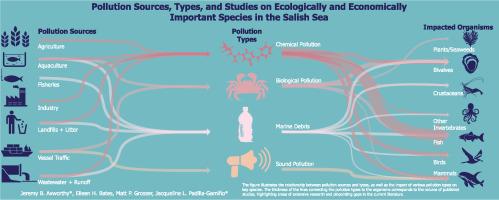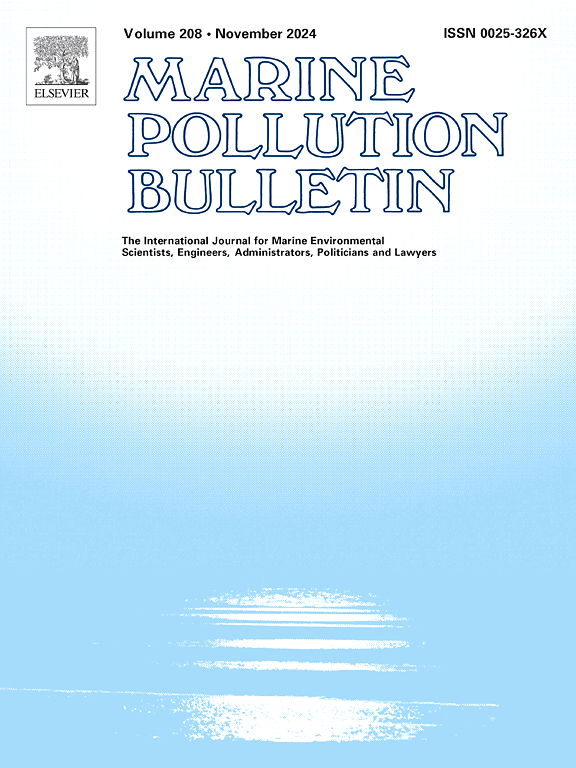污染对萨利希海重要生态和经济生物的影响
IF 4.9
3区 环境科学与生态学
Q1 ENVIRONMENTAL SCIENCES
引用次数: 0
摘要
海洋污染威胁着生态系统、生物多样性和人类健康,影响物种适应性,破坏食物网,并使基本栖息地退化。本综述研究了海洋污染对萨利希海主要物种的影响。萨利希海是一个重要的生态系统,支持包括濒危物种在内的多种野生动物和依赖渔业、水产养殖和旅游业的当地经济。我们总共合成了116项研究,包括化学污染(78)、生物污染(15)、海洋垃圾(15)和声音污染(8)。对海洋化学污染的研究主要集中在鱼类(41),其次是鸟类(11),哺乳动物(7),双壳类动物(7),然后是无脊椎动物(2)。未来的调查应扩大物种覆盖范围,评估不同生命阶段,并评估气候变化对污染物积累的影响。生物污染主要是由养殖贝类和鲑鱼等故意引入的物种造成的,它威胁着本地物种,并可能传播病原体。迫切需要研究粪便传播的病原体对海洋生物的影响,以及海草床、养鱼场和污水排放对病原体动态的影响。海洋垃圾,特别是废弃的渔具,对当地生物产生负面影响,而轮胎珊瑚礁和微塑料的影响仍然知之甚少。研究应结合实验室和实地评估来分析微塑料摄入,并改进检测技术,为保护工作提供信息。噪音污染的研究主要集中在虎鲸等海洋哺乳动物身上,强调声音污染如何扰乱交流和行为,从而间接改变食物网和社区动态。未来的研究还应包括其他海洋物种,包括鱼类和无脊椎动物。了解污染的影响对于制定有效的缓解战略、保护海洋生物和确保为子孙后代可持续地管理海洋资源至关重要。本文章由计算机程序翻译,如有差异,请以英文原文为准。

Effects of pollution on ecologically and economically important organisms of the Salish Sea
Marine pollution threatens ecosystems, biodiversity, and human health, impacting species fitness, disrupting food webs, and degrading essential habitats. This review examines the effects of marine pollution on key species in the Salish Sea, a vital ecosystem supporting diverse wildlife, including endangered species, and local economies reliant on fishing, aquaculture, and tourism. In total, we synthesized 116 studies including chemical pollution (78), biological pollution (15), marine debris (15), and sound pollution (8). Research on marine chemical pollution has primarily focused on pollutants in fish (41), followed by studies on birds (11), mammals (7), and bivalves (7), then invertebrates (2). Future investigations should broaden species coverage, assess various life stages, and evaluate the impact of climate change on pollutant accumulation. Biological pollution, driven mainly by intentionally introduced species like farmed shellfish and salmon, threatens native species and can spread pathogens. There is a pressing need for research on the effects of fecal-borne pathogens on marine organisms and the influence of seagrass beds, fish farms, and sewage outfalls on pathogen dynamics. Marine debris, especially derelict fishing gear, negatively impacts local organisms, while the effects of tire reefs and microplastics remain poorly understood. Research should integrate laboratory and field assessments to analyze microplastic ingestion and improve detection technologies to inform conservation efforts. Noise pollution research has focused on marine mammals like killer whales, highlighting how sound pollution disrupts communication and behavior, which can indirectly alter food webs and community dynamics. Future studies should also encompass other marine species, including fish and invertebrates. Understanding pollution impacts is crucial for developing effective mitigation strategies, protecting marine life, and ensuring sustainable ocean resource management for future generations.
求助全文
通过发布文献求助,成功后即可免费获取论文全文。
去求助
来源期刊

Marine pollution bulletin
环境科学-海洋与淡水生物学
CiteScore
10.20
自引率
15.50%
发文量
1077
审稿时长
68 days
期刊介绍:
Marine Pollution Bulletin is concerned with the rational use of maritime and marine resources in estuaries, the seas and oceans, as well as with documenting marine pollution and introducing new forms of measurement and analysis. A wide range of topics are discussed as news, comment, reviews and research reports, not only on effluent disposal and pollution control, but also on the management, economic aspects and protection of the marine environment in general.
 求助内容:
求助内容: 应助结果提醒方式:
应助结果提醒方式:


